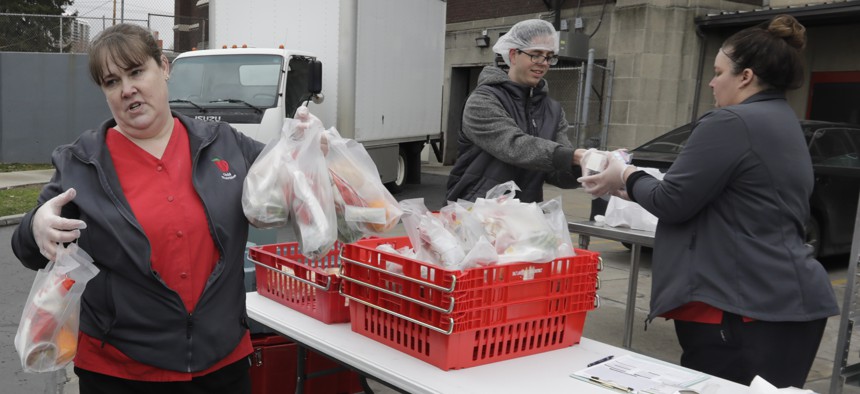Crowdsourcing to Fight a Pandemic

Cities across the country are working to protect their most vulnerable residents as the pandemic unfolds. AP Photo/Rick Bowmer
COMMENTARY | Cities are rapidly sharing ideas to identify which actions work best to protect residents hardest hit by the coronavirus.
In city halls across the country, mayors and their staff are scrambling to find creative solutions to confront the overwhelming crisis brought on by the coronavirus pandemic.
We know the feeling. In late 2008, one of us assisted Philadelphia Mayor Michael Nutter in preparing his budget at the outset of the Great Recession. City leaders projected resolve and reassurance in the face of a financial meltdown that would soon cost millions their jobs and homes. But behind closed doors, we were struggling to determine the best approach to help residents weather the economic downturn. We began frantically contacting economists, budget experts and our colleagues in other cities to find anything that might be remotely impactful.
Fast forward to our current crisis. Cities are rapidly crowdsourcing pandemic response ideas from experts, community leaders and other local governments across the country. This sharing and cross-pollinating of policy ideas through Twitter, Slack, text and virtual meetings is happening at an unprecedented speed and scope. Local governments are now deploying new, bold and, at times, untested strategies within hours instead of the weeks or months it took before. As leaders continue to deploy aggressive measures to contain the spread of the virus, it is critical that they gather data on what is working and share the results with the public and other city leaders.
It is clear from the city leaders we've spoken with over the last week that they are hungry for evidence-based solutions and eager to embrace this test-learn-adapt approach. Below are several of the new economic, housing, education and criminal justice playbooks local governments are building to assist their most vulnerable residents as the crisis unfolds.
Stopping Utility Shut Offs and Waiving Related Late Fees
Many cities, including Austin, TX, Denton, TX, Minneapolis, Philadelphia and Tulsa, as well as states like New York, New Jersey, Connecticut and Ohio, have ordered that utility services suspend shut-offs to avoid what many local governments fear could be sweeping defaults on bill payments. Some utilities, like the Central Arkansas Water and Greater Cincinnati Water Works, have started to restore service to those who had been previously shut off. Given that 40% of adults cannot easily cover an unexpected $400 expense, offering this immediate relief will ensure that residents have the basic necessities of clean water, heat and electricity.
Enacting Moratoriums on Evictions, Foreclosures and Tax Lien Sales
At a time when many low-wage workers are losing their jobs or facing drastically reduced incomes as employers scale back hours, cities like Baltimore, Seattle, Los Angeles, Atlanta and Detroit, as well as states like California, New Hampshire and North Carolina and the U.S. Department of Housing and Urban Development have placed moratoriums on evictions and foreclosures. Others, including Philadelphia, are also discussing moratoriums on tax lien sales.
Reducing the Inmate Population Quickly and Safely
Jails and prisons have long been susceptible to viral outbreaks due to their crowded living conditions and inadequate health care. Cities and counties including San Francisco, Seattle, Philadelphia, Los Angeles County and Cuyahoga County, Ohio are attempting to reduce their jail population by, among other things, releasing people held pretrial on cash bail, filing charges only for serious violent offenses and expediting release for those who have served nearly all of their sentences.
Expanding Services for the Homeless
Individuals experiencing homelessness are highly vulnerable to outbreaks such as Covid-19. The City of San Francisco created a $5 million fund aimed at reducing the risk of exposure for the homeless, marginally-housed seniors and people with underlying health conditions. Some of this funding has been used to provide RVs for individuals experiencing homelessness or who cannot otherwise quarantine safely. Meanwhile, Portland, Oregon has expanded the number of portable toilets and hand washing stations and kept shelters typically closed in March open.
Providing Children Access to Free Meals
About 30 million children receive meals daily through the National School Lunches Program—not just lunch but for some, breakfast and dinner as well. These children are at risk of going hungry as their schools close for weeks and, possibly, months. School districts in cities like Alexandria, Virginia, Chicago, Washington, D.C. and in Charlotte-Mecklenburg schools in North Carolina are now offering free meal pick-up for all children in school parking lots to increase social distancing. Rural school districts are also experimenting with providing free meals along bus routes.
The pandemic has surfaced the country’s deep disparities, fueled by structural racism, which—without concerted effort by policymakers at every level of government—will only be exacerbated by this crisis. Policy leaders need to ask themselves: How will the decisions they make today lessen the toll on those who were suffering long before this virus appeared? What structural reforms can we make now that will improve the lives of our most vulnerable residents when this finally ends?
The strategies cities enact can provide much-needed support to vulnerable residents, but cities cannot lean too heavily on any single policy or approach. Local governments need to test and implement multiple strategies while harnessing every available resource and tool to maximize the impact of these efforts.
Cities that invest in their ability to spot, track and diagnose these challenges—and measure the impact of their interventions—will be better equipped to be both nimble and decisive in responding. Not just in this crisis, but also the next one.
Maia Jachimowicz is the Vice President for Evidence-Based Policy Implementation for Results for America, and previously served as Director of Policy in the Office of the Mayor for the City of Philadelphia. Zachary Markovits is the Director of City Progress for the What Works Cities initiative. Together they are leading a national initiative to accelerate economic mobility in cities.
NEXT STORY: Red and Blue America Aren’t Experiencing the Same Pandemic





